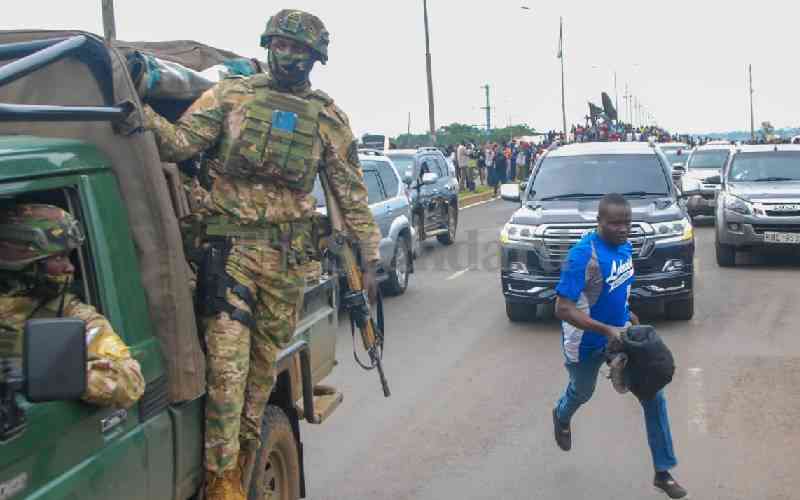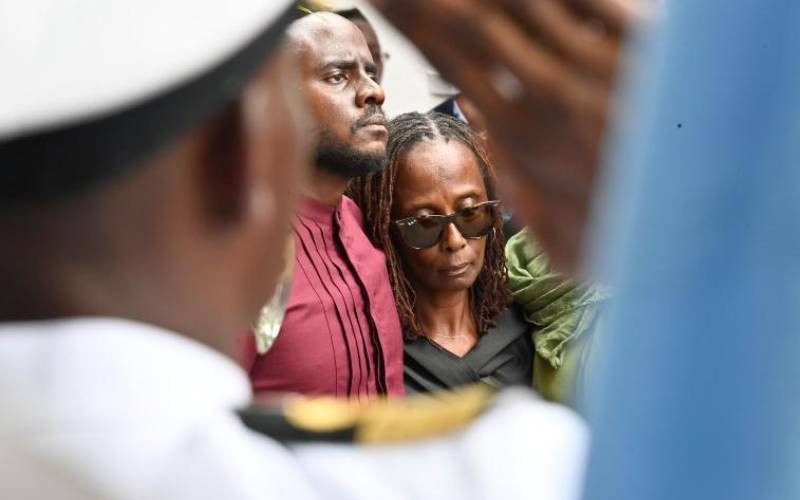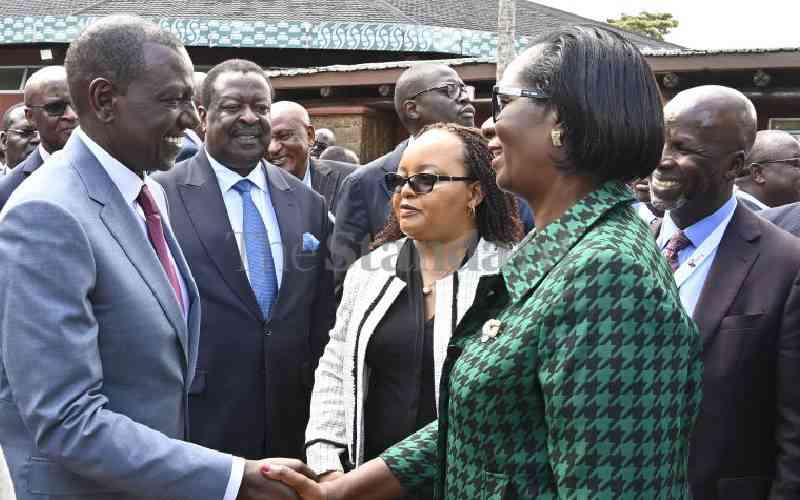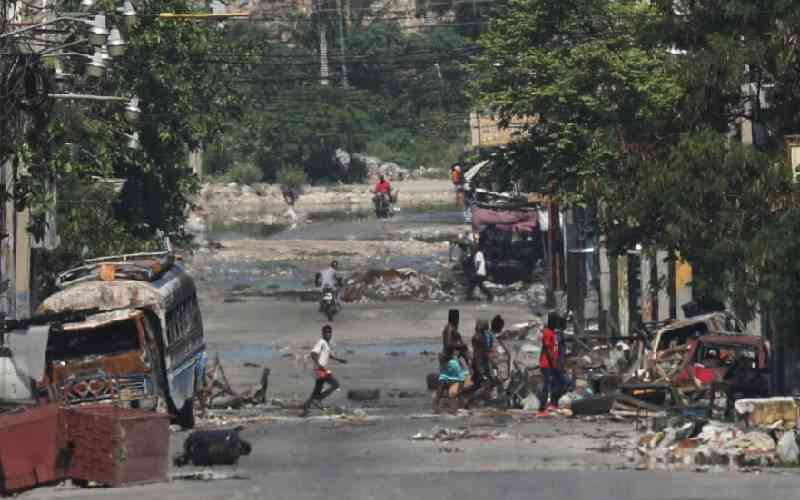By Felix Olick
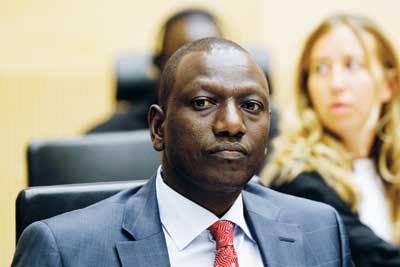 |
|
Ruto has asked his Visa conditions, which restrict movement in The Netherlands, modified. [PHOTO: FILE/STANDARD] |
KENYA: Jubilee alliance running mate William Ruto has requested postponement of his trial at The Hague to give his defence more time.
The request comes even as it emerged the scope of the cases is likely to be broadened.
In his observations ahead of the pre-trial status conference on February 14, Ruto asked judges to provide his defence team with more time to prepare. He argued that due to late disclosure of prosecution materials by International Criminal Court Prosecutor (ICC) Fatou Bensouda, his defence team faces arduous task of putting up a watertight case on April 10.
Restriction extended
“It is submitted that such extensive late disclosure, which is still continuing, was anticipated by neither the defence team nor the Chamber. In those circumstances, the defence invites the Chamber to consider providing it with more time to prepare its case,” his lawyer David Hooper said on Wednesday.
Ruto and journalist Joshua arap Sang also want their Visa conditions, which restrict their movement in Netherlands to The Hague modified.
They want the restriction extended to 60km from the current 30km radius, citing the expected lengthy trials.
“Mr Sang, through Trial Chamber, would like the Registry to liaise with the host State to modify his usual Visa conditions, which restrict his movements within The Netherlands to The Hague. The defence submits that when the trial begins, and Mr Sang is expected to remain in the country for an extended period of time, this restriction would be unduly burdensome,” Sang’s lawyer Katwa Kigen argued.
Key witness
On Tuesday, Jubilee presidential flag bearer Uhuru Kenyatta also asked the Chamber to change the day set for his trial.
The Deputy Prime Minister said his case should be referred back to the Pre-Trial Chamber for reconsideration after the prosecution dropped evidence of a key witness.
In his submission, he argued the prosecution used evidence presented by witness number four, whose testimony was allegedly dropped.
During the Pre-Trial stage, the judges held that witness number four was present as a Mungiki representative in State House meeting attended by Uhuru, President Kibaki, among others, to plan retaliatory attacks against perceived ODM supporters in Nakuru and Naivasha.
Uhuru goes on trial alongside former Head of Civil Service Francis Muthaura on April 11.
Stay informed. Subscribe to our newsletter
Incidentally, Independent Electoral and Boundaries Commission (IEBC) also set April 11 as the run-off date if the presidential contest is not squared in the first round.
Recent opinion polls have predicted a tough political duel between Uhuru and Prime Minister Raila Odinga, likely to spill into second leg.
According to transition timelines unveiled by Assumption of the Office of President Committee last week, the fourth president will be sworn-in on March 26, probably if the trials against the two suspects are on at The Hague.
But in yet another submission to the three-judge bench headed by Presiding Judge Kuniko Ozaki from Japan, it emerged the scope of the cases against the four Kenyans could be broader and would even involve happenings during the 2005 Constitutional referendum.
Bensouda intends to call at least 14 witnesses to testify on the 2005 referendum period against Sang.
In his submission, Sang lamented about the volume of this evidence, which he insisted pre-dates the scope of the charges.
“This significantly broadens the background of the allegations against the accused and places an onerous investigative burden on the defence very close to the start of trial,” Kigen argued.
Documentary evidence
On January 9, Bensouda disclosed to the defence voluminous incriminatory evidence the prosecution intends to rely on to nail the suspects.
The prosecutor submitted a list containing 1,529 items in the Ruto-Sang case, with the first part containing 1,115 witness statements and related material, while the second part contain 414 documentary evidence including audio/video material.
In the second case against Uhuru and Muthaura, the prosecutor submitted a list containing 945 items with witness statements constituting 604 items while other documentary evidence including audio/video material comprises 341 items.
 The Standard Group Plc is a
multi-media organization with investments in media platforms spanning newspaper
print operations, television, radio broadcasting, digital and online services. The
Standard Group is recognized as a leading multi-media house in Kenya with a key
influence in matters of national and international interest.
The Standard Group Plc is a
multi-media organization with investments in media platforms spanning newspaper
print operations, television, radio broadcasting, digital and online services. The
Standard Group is recognized as a leading multi-media house in Kenya with a key
influence in matters of national and international interest.
 The Standard Group Plc is a
multi-media organization with investments in media platforms spanning newspaper
print operations, television, radio broadcasting, digital and online services. The
Standard Group is recognized as a leading multi-media house in Kenya with a key
influence in matters of national and international interest.
The Standard Group Plc is a
multi-media organization with investments in media platforms spanning newspaper
print operations, television, radio broadcasting, digital and online services. The
Standard Group is recognized as a leading multi-media house in Kenya with a key
influence in matters of national and international interest.


